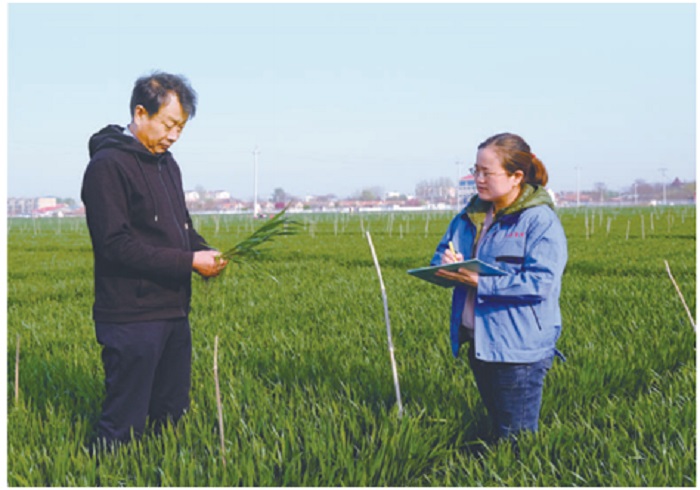



Hou Yuanjiang, general manager of a crop seed company in east China’s Shandong province, still feels an upsurge of emotion when he recalls that Qingfeng No.1, a wheat seed jointly bred by his company and the Agronomy College of Shandong Agricultural University after 11 years’ efforts, set off to the outer space with China’s manned spacecraft Shenzhou-7 on Sept. 25, 2008.
According to Hou, he watched on TV at home the successful launch of Shenzhou-7 from the Jiuquan Satellite Launch Center in northwest China’s Gansu province. Qingfeng No. 1 was one of the seeds that were selected to travel in space with the spacecraft.
“Wheat breeding is extraordinarily arduous. It’s time-consuming and only has a very small chance of success,” said Sun Xuliang, a senior agronomist of the bureau of agriculture and rural affairs of Qingdao, Shandong province.
Since wheat breeding includes such procedures as parental combination, comparative experiment, regional trial, and pilot production, it usually takes more than a decade to eventually select a new variety from tens of thousands of strains, Sun explained, adding that some wheat breeding experts couldn’t even develop one new variety during their whole lifetime.
Hou is particularly rigorous in scientific research and seed breeding. Hou’s team starts the hybridization for wheat breeding every April, which is followed by investigations and observations. During the harvest season of wheat, Hou would go to wheat field around 5 a.m. almost every morning to check the performance of wheat varieties in such aspects as disease resistance, lodging resistance, and yielding ability.
Thanks to Hou’s tenacity, the wheat seed Qingfeng No.1 was proven successful in 2006, marking a historic zero-to-one breakthrough for Hou’s company in breeding new varieties.
With the help of agricultural departments in Qingdao, Hou’s company has established long-term technical partnership with higher education institutions and scientific research institutes such as Shandong Agricultural University and Shandong Academy of Agricultural Sciences.
In 2016, Liaolan township, Pingdu city of Shandong, where Hou’s company is based, set up Qingfeng work station of academicians and experts to provide guidance on the breeding of new varieties of wheat and peanut and point the direction for breeding on site. The station now has one academician and six experts.
So far, eight of the new wheat varieties of the Qingfeng and Qingnong series developed by Hou’s company have been examined and approved by provincial-level authorities, and six new peanut varieties bred by the company have been registered at relevant national authorities.
Hou has combined breeding of superior varieties with demonstration of crop varieties in Qingdao and its surrounding areas, namely promoting the growing of new varieties in breeding bases of superior varieties first, and then further expanding the planting area of these varieties in surrounding areas.
In an effort to breed high-quality seeds, Hou has also established a specialized cooperative for the production and marketing of crop seeds. More than 5,000 local households have become members of the cooperative and joined in the breeding and production of superior varieties.
The cooperative purchases wheat seeds from local farmers and offers them a price which is 0.2 yuan (about $0.03) higher than that of commercial wheat per kilogram, attracting households in more than 30 villages in the locality to the production of wheat seeds.
As a result, the cooperative sees the planting area of the seeds of improved wheat and peanut varieties and other crops reach nearly 50,000 mu (about 3333.33 hectares) and their output exceed 20 million kilograms per year.
Hou’s company invites farmers and companies to the fields to choose seeds, and provides them with all-round services for the planting of new varieties.
“After farmers choose our seeds, it’s our responsibility to teach them how to grow the new varieties until they have mastered all the procedures. We explain new techniques to them and often offer them products in trial period for free. We also sign contracts for economic risks with farmers to make sure they can get as much profit as possible,” Hou said.
In order to expand business to other provinces, like Anhui province and Jiangsu province in east China, the company has carried out comprehensive cooperation with local seed companies in various links during the production and promotion of new varieties, including trial planting, examination, and promotion.
New wheat varieties bred by the seed company have been grown in large areas in Chinese provinces including Shandong, Anhui and Jiangsu. The company has so far seen the acreage of its seeds of new crop varieties surpassing 20 million mu, increasing social and economic benefits by more than 1.8 billion yuan.


The Humanitarian Service Diamond Awards has.
A Chinese Company, Inner Galaxy Steel.


The Programme Coordinator, Regulatory, Compliance and.


A Non-Governmental Organization (NGO), Committee for.
The Trustfund Pensions Limited has chided.


The House of Representatives Committee on.
The China General Chamber of Commerce.


Senator Chuka Utazi who represented Enugu.


An Abuja based Legal Practitioner, Ugochukwu.


The African business community in Yiwu,.
Leave a Comment